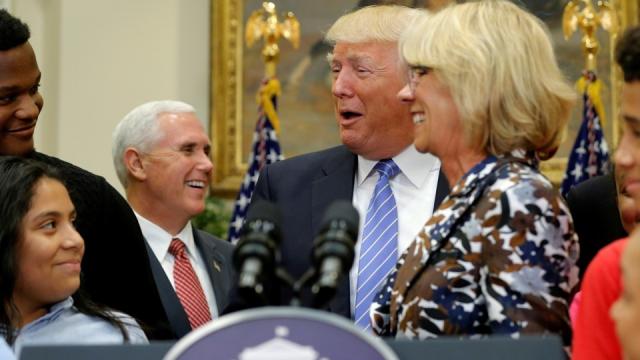
This year’s State of the Union address, an eighty-minute epic, covered a wide range of conventional Trump topics. Despite his allusion to a “new wave of optimism” sweeping the country,” his priorities in the speech were certifiably Trumpian: protectionist tariffs, limiting immigration, tax cuts. In fact, Trump spent less than one minute talking about education – despite that it represents the Republican Party’s most ambitious agenda in decades.
Since November, Republicans have quietly pushed a bill through the House's education committee despite calls for analysis and hearings. The bill, known as the “Promoting Real Opportunity, Success, and Prosperity Through Education Reform Act,” or Prosper Act, would reauthorize the Higher Education Act (HEA) while enacting sweeping changes to the higher education landscape in the process.
Reauthorizing the HEA is nothing new – it has been updated or reauthorized eight times since its original passage in 1965 – but changes historically included modest efforts to adjust to increased costs and technological shifts in the industry as education goes digital.
The Prosper Act, however, is not a modest update. The 590-page bill would bolster conservative voices on campuses while cutting $15 billion in student aid over the next decade, radically reshaping the definition of higher education.
Here’s how it would work:
Goodbye, Loan Forgiveness
In the name of savings, the Prosper Act would end Public Student Loan Forgiveness (PSLF) programs. The trick here is that PSLF would end, but not be eliminated. Rather, the bill narrows repayment options down to two options – simplifying a system that currently offers nine options – but neither of these options would include eligibility for loan forgiveness in exchange for service.
Similarly, income-based repayment options with loan forgiveness would be eliminated as well. Under current rules, borrowers who put 10 percent of their discretionary earning toward their loans for 20 years can qualify for the balance to be forgiven. Under the Prosper Act, borrowers would pay a minimum of 15 percent, with no limit on the number of years for repayment.
Higher Debt, no Subsidies
The Prosper Act would increase the maximum amount that students can borrow, raising the total for students still filing as dependents from $31,000 to $39,000, or up to $60,250 for independent undergraduates.
This measure appears to logically address tuition increase: As college gets more expensive, loan totals should go up, right? However, the Prosper Act would eliminate loan subsidies, so student-borrowers would begin accruing interest on those loans as soon as they’re received.
The bill, in turn, increases Pell Grant disbursements by $300 million, but blunts the effect of this funding increase by opening up Pell Grant eligibility to students in short-term programs – a move that could be a boon for online and for-profit certification programs.
Fewer Regulations on For-profit Colleges
In an effort to erase Obama-era education rules from history, the Prosper Act would walk back two regulations enacted by the previous administration: borrower defense and gainful employment. Under the gainful employment rules, all educational programs at for-profit colleges must result in steady work employment for the degree or certificate recipient – one of the many Obama-era regulations meant to curtail fraudulent for-profit education scams across the country.
Borrower defense, the formal mechanism meant to protect students who were defrauded by mostly for-profit programs, is also on the chopping block. For thousands of students waiting for their claims to be reviewed, this won’t be a surprise: The current Education Department hasn’t reviewed new claims since Trump’s administration took office.
Insulation for Religious Institutions
The Prosper Act contains provisions to prevent the local, state or federal government from “taking any adverse action against a school receiving funds under Title IV of the Higher Education Act (HEA) for refusing to comply with HEA requirements because of their religious mission or affiliation”. In response, the Human Rights Campaign called this “state-sanctioned discrimination”.
In practice, the measure would allow religious institutions to restore discriminatory practices, like banning “sexual identity outside of the scriptural expectation” or allowing campus groups to restrict membership to students of a particular religion or faith without threat of losing federal funding.
But Not So Fast...
The bill, in total, favors religious universities and for-profit colleges, giving both social and financial advantages to those schools. There’s plenty of reason to suspect that Republicans could ram this unpopular bill through the House and Senate. However, this time there are a few key factors working against them.
First, lawmakers abandoned any gestures toward bipartisanship early in the process, with Republicans working independent of Democratic input. Lawmakers on both sides of the aisle had even shared an interest in simplifying paperwork – especially repayment language and federal aide applications. But the Republican majority denied 40 amendments to the Prosper Act from Democratic colleagues.
This intransigence may come back to haunt Republican lawmakers. The bill will need 60 votes to pass the Senate, a challenge compounded by a war of words between the GOP and Senate Democrats.
Numbers aren’t the only factor helping Democrats, either. With midterms approaching, Republicans are running out of time. Experts already suggest that even the most minor disruption to the bill could push the timeline into 2019 or further – a troubling assessment for a GOP that is adept at creating ample drama, but little change.
3 WAYS TO SHOW YOUR SUPPORT
- Log in to post comments












